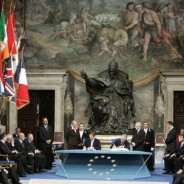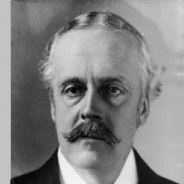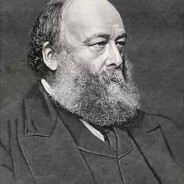
Miscellaneous Writings
NATO’s 70th Birthday and UN COP 25
This article was first published in New View magazine Winter Issue 94 Winter Jan – March 2020 To form any judgments about a phenomenon in contemporary events we can keep in mind three elements – the context of the event (awareness of how the event relates to the past), wakefulness (awareness of what’s going on now in relation to the event) and insight (understanding how the event relates to what seems to be approaching us from the future). With these in mind, let us consider two recent contemporary events: NATO’s celebration of its...
read more“UNITE Behind the Science” of Greta Thunberg?
This article was first published in New View magazine, Issue 93 Oct-Dec 2019 It is a challenge in today’s world to think for oneself when from all sides of our electronic public arena, from news broadcasts and current affairs programmes to dramas and advertisements one is being bombarded by the same messages, day in, day out. It is hard enough for supposedly educated mature, middle-aged people who were brought up in the world of print culture and private thoughts and imaginations to think for themselves in this situation, let alone...
read moreBrexit as a Spiritual Question (2): The Continental/Catholic Dimension
This article was first published in New View magazine, Issue 91 April-June 2019 My previous article for New View: “Brexit as a Spiritual Question: Why the EU is the Wrong Direction for Europe and the Modern Age”, was intended as the first of a series of three articles looking at the origins of the EU. It considered those origins in terms of one of the two elitist streams mentioned that have been active in guiding the EU project into existence and maintaining and developing it since the 1950s, namely, the Anglo-American stream. This...
read moreBrexit as a Spiritual Question (1) – Why the EU Is Wrong for Europe
This article was first published in New View magazine (Issue 90, Jan-Mar 2019) Brexit is not only an economic and political issue; it is also a spiritual issue, a cultural issue of our time, because the EU is a construct that contradicts the essential spiritual impulses of the modern age, which began in the 15th century. Britain, for good and ill, has played a major role in shaping this modern age, in which, according to Rudolf Steiner, the British people and the other English-speaking peoples who proceeded from them play a vanguard...
read more“Globalism”, “Nationalism”, and “Identity Politics”
This article was first published in The Present Age magazine Nov. 2018 Vol.4 No.8 This month we commemorate the Armistice of 11 November 1918 and the end of the First World War, although fighting of various kinds went on in numerous countries for the next few years, and although the 1914-1918 conflict would soon be seen by more far-sighted observers as the ‘first round’ of a conflict that would sooner or later begin again. Anthroposophers are familiar with Rudolf Steiner’s statements about nationalism1 being a...
read moreMusical Healing (Heilung) for European Culture?
This article was first published in the monthly magazine The Present Age Vol. 4 No. 6 Sept 2018 The events in the eastern German city of Chemnitz (Karl-Marx-Stadt during the Communist era) in late August this year, the brutal murder and assaults, the angry reaction of the citizens, the paranoid, exaggerated response of the mainstream media and the cynical attempts of political parties and factions of the Far Right and Far Left to exploit the situation to their own advantage were a symptom of the social sickness that prevails in Europe today:...
read more‘Narratives’: 1914-2018: The War on Russia, Germany and ‘Hate’
This article was first published in New View magazine #89 Oct.-Dec. 2018 On 5 September the British government revealed, on the basis of what it called “exhaustive CCTV analysis”, the identities of the two men it claimed had arrived in Britain on 2 March and had been responsible for deliberate nerve agent poisonings in and near the city of Salisbury. It said that these men were Russian agents working for the Main Intelligence Directorate (GU, formerly GRU), the military intelligence agency of the General Staff of the Armed Forces of the...
read more‘A’ Customs Union? ‘The’ Customs Union? British EU Delusions
This article was first published in The Present Age magazine Vol. 3 No. 12, March 2018 When I was teaching English in Japan many years ago, one of the many difficulties my students had with the English language was the difference between ‘a’ and ‘the’, which language teachers and linguists call the indefinite and definite article respectively. It was not surprising that the students had those difficulties, as there is no article at all in Japanese: in their own language the Japanese get by quite contentedly without...
read moreThe Cecils and the End of the British Empire
This article was first published in the monthly magazine The Present Age Vol. 3 No. 7 in October 2017 This is the fourth in a short series of articles about the historical consequences of the rivalry between Philip IV (the Fair) of France (r.1285-1314), who destroyed the Order of the Knights Templar, and his rival Edward I of England (r. 1272-1307) who sought to conquer Wales and Scotland. Philip married his daughter to Edward’s son, and out of this fateful marriage later came the Hundred Years War (1337-1453) between France and England,...
read moreThe Cecils – Uncle and Nephew
This article was first published in the monthly magazine The Present Age September 2017, Vol. 3 No. 6 This is the third in a series of 5 articles which is rooted in the tortuous destiny between England and France, the two western countries which ‘pioneered’ modern nationalism, that view of life that has had such fateful consequences over the past 250 years. The modern western concept of the centralised, administrative state emerged in Britain and France 1300-1600 and there was a gradual identification of the British and French peoples with...
read more








